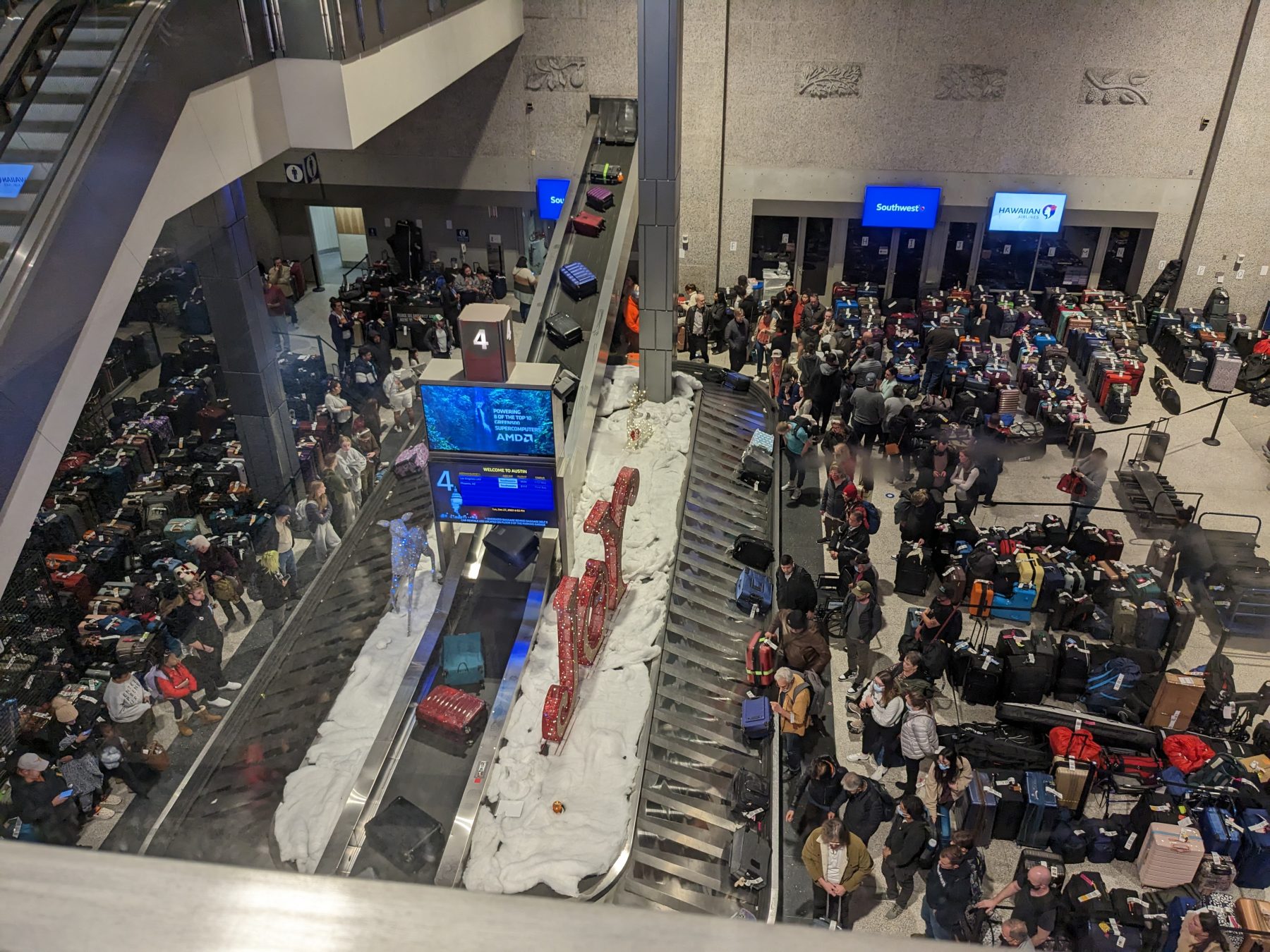By Gumbo
On the evening of Christmas Day, I was looking forward to being home in Austin from visiting my family in Louisiana. Sleeping in my own bed, seeing my cats again, and feeling the high energy of the winter holiday season begin to settle back into the routine of a new year were little more than warm desires in the back of my mind. By the predawn hours of 27 December, those little warm desires had evolved into a visceral need originating somewhere deep in my gut. Our 56 minute connecting flight with United Airlines from Houston to Austin was initially scheduled to take off at around 9:30 a.m. on 26 December, was delayed to 8:30 p.m., then delayed again and again, canceled, un-canceled, and finally canceled around 2 a.m. on Tuesday.
By the time our flight was canceled, we had no options left except to hope for a rescheduled flight—something we were assured would be unlikely until 30 December at the earliest—or rent a car and drive the final three hours from Houston to Austin. All of the hopeful passengers began their exodus towards the rental car building, taking a shuttle bus and effectively leaving the airport to discover only one agency was even open. Then, we were told that we could not rent a car until 6 a.m. because of same-day reservation clauses. Heads hanging low and eyelids lower, we schlepped back to the airport looking for a place to sit.
The unsettling effect that being stuck in a place not built for humans to actually inhabit has on the body and mind is well established. Because we had “left” the airport terminal for the rental car building, we were outside of the security zone established by TSA (and thus unable to access the clean bathrooms, water fountains, and adequate seating inside the terminals), and because TSA would not arrive for their first shift for another three hours, we were unable to re-enter. We were without luggage, as our checked bags (including all of our clothes, daily medicine, and various toiletries) had already been loaded onto the plane that would never take off and they did not have the staff to unload them again for us. We could not depart for any of the amenities that the city of Houston itself might offer, as there were no clear public transit options between the airport and anywhere else. Exhausted, sleep-deprived, and dehydrated, stuck in the liminal space between an airport and its host city, we were, in essence, nowhere at all. My partner suggested that maybe we had died en route to Houston and were simply in purgatory, awaiting judgment.
At 4 a.m., the airport began to stir with signs of life again. People arrived for their opening shifts and early morning flights. We bussed back to the rental car building and, after some negotiating and another $125 spent on a rapidly-maxing credit card, were finally on the road to Austin. Our luggage would not arrive until later in the day on two separate flights and we would not be fully reunited at home with all of our belongings until 8 p.m. on 27 December, over 24 hours after we departed from New Orleans.
United Airlines was one of the more prepared airlines going into this holiday season. Our flight delays and eventual cancellation were due to delays elsewhere holding up the pilots and flight attendants and a hiccup in the scheduling system that prevented the airline from properly adding an attendant to the FAA flight register. Although everyone required to be on the airplane was present at the terminal, they could not get the system to reflect that for regulatory purposes. By the time they did, the attendants had been sent on mandatory rest leave after 16 hours on the job and could not be summoned back until they had been away for at least 8 hours. I refuse to be upset that workers were getting safe treatment on the job during such a demanding, stressful period, and I am happy to report that most of the other would-be passengers also solemnly accepted the news.
Southwest Airlines, by contrast, suffered a catastrophic failure of their entire system. A failure that, according to Southwest Airlines employee unions, had been foreshadowed for years by poor IT infrastructure and a scheduling system based on severely-outdated phone software. Rather than using 21st-century technology to easily keep up with which flights employees are on at a given time, Southwest’s software allegedly tries to assume where employees might be based on where they were previously and requires everyone to call in to the scheduling office to declare their location and ability to work. With cascading impacts due to the massive winter storm that affected nearly the entire continental United States, Southwest issued an all-hands call, meaning that every single employee needed to personally call in. An absolutely unmanageable amount of phone calls meant the situation only continued to break down.
The takeaway from this major infrastructure failure is threefold. First and foremost, this disaster is only the latest in a long line demonstrating that air travel is crucial transportation infrastructure and should be nationalized and regulated as such. Second, there has never been a better argument for national high-speed rail networks. Third, and perhaps most insidious, is how this debacle has laid bare the ways in which capitalists exploit customer-employee divisions in the working class to divert the blame away from their own profiteering.
There are signs that the Department of Transportation was well-aware of airline logistics issues for months prior to the storm. And further, the storm was forecast at least five days out by the National Weather Service, providing ample time to implement an emergency operations plan before Southwest Airlines became responsible for 84% of all canceled flights to and from airports in the United States on Tuesday, 27 December 2022. Southwest’s own workers have been sounding the alarm for even longer, demanding updates to the scheduling system as recently as 2018’s contract negotiations. The Union of Southwest Airlines Flight Attendants, TWU Local 556, has even had a website live for months demanding that Southwest “Make It Right” with demands including pay for time worked, safe schedules and technology fixes to minimize failures that impact workers and passengers.
It is long past time for airlines to come under public, democratic ownership to prevent future crises. Air travel is such a ubiquitous mode of transit that one could be forgiven for not considering who actually decides how it is run. The workers who load the luggage, fly the planes, and serve the food all take pride in what they do, yet they are not the ones who make decisions about how the airlines are run. Nor do the passengers make decisions about their travel experience. Instead, decision-making power rests in the hands of executives whose only real goal is to generate profits for themselves and their shareholders. Had workers been given more control over their workplace, as they struck for in 2018, there is a distinct likelihood that the scale of catastrophe Southwest is now facing could have been mitigated, or even averted entirely. Millions of people fly through airports in the United States every day, yet we leave such critical infrastructure in the hands of profit-driven capitalists who have no vested interest in providing a public service.
These same airlines, which receive federal bailout money from a neoliberal US government, turn around and lobby against the time-tested travel method that could have mitigated so much of this disaster: railroads. Southwest Airlines in particular lobbied against high-speed rail travel in Texas in the 1990s. Modern high-speed rail travel throughout the US would have drastically reduced travel disruptions, as trains are less likely to be affected by winter weather than airplanes. Trains are also far better for the environment; data from the US Bureau of Transportation Statistics show that Amtrak used 35% less energy per passenger-mile than domestic air travel in 2020. Rather than develop truly modern rail networks with robust worker benefits, however, Joe Biden’s administration is focused on electric vehicles and strike breaking like a rail baron.
Finally, the delays and cancellations have pit worker against worker across the country. Customers—themselves more than likely just working people visiting families for the holidays— were left with zero options and zero assistance. Companies put their own workers out on the front line rather than own up to their profiteering. The state even opted to intervene on behalf of these capitalists, sending police to airports to “increase security presence” and reportedly threatening to issue tickets and arrest people for trespassing for waiting in line to get a ticket refunded. Here belies the darker nature of the service industry, as companies simultaneously abuse workers and customers alike and then tell each side that the other is their adversary.
One could imagine airline execs saying to their workers: We can’t offer you better working conditions, and if you dare to not work overtime or call in sick, then we will fire you without hesitation. By the way, we will also not accept telemedicine doctor’s notes, a form of correspondence that has become increasingly popular since the start of the COVID-19 pandemic, because we did not plan well enough for this.
Then immediately turn around to say to their customers: We’re sorry for the wait, we are currently understaffed for handling the high volume of calls we have received. Also, we cannot offer an adequate refund on your canceled flight, as we do not exchange tickets with any other airlines and will not be able to ensure you or your luggage will arrive at your intended destination in a timely manner because we have no available flights.
The energy in Austin-Bergstrom International Airport late on Tuesday, 27 December was frantic. I was retrieving my luggage, which arrived around 6:00 p.m. on a separate plane from both the plane that my partner and I were due to be on the night before and the plane on which her luggage arrived earlier that day. As I entered, I was greeted with a commotion that rubbed against my ears like sandpaper. Shouts of “What the fuck!” and “So yeah, turns out that was bad information,” littered the air surrounding the Southwest and American Airlines baggage claims. I saw an exhausted Southwest baggage worker who had helped me find the United Airlines baggage claim and my partner’s suitcase that afternoon. She had been moving and lifting luggage for unknowable hours, and I yearned to cross over the roped off line and lend a hand. Across the hall, news cameras rolled on the sick game of Snake being played by the dozens of upset travelers queuing up to ask after their belongings.
More than 24 hours after we departed New Orleans, myself, my partner, and all of our belongings were finally reunited at home in Austin. We were forced to spend a few hundred dollars more than we had budgeted for, which for a union teacher and a public servant is no chump change. We have yet to receive a cash refund by United Airlines for our canceled flight and additional incurred expenses. Other comrades have missed gigs, losing out on money that is desperately needed for rising Austin rents. Many have been forced to pay for longer stays in airport parking garages and hotels. It all adds up.
Every day this holiday season, someone has made money off of the confusion. Be they a credit card financier, an airline CEO, or an airport restaurateur, there is a capitalist making money off of our misfortune. Disruptions like what happened this holiday season are perfectly precedented and absolutely avoidable, but with a privatized, for-profit transportation system, they will only worsen. We workers deserve a publicly accountable, democratically-run, multimodal transit network. We deserve better.

